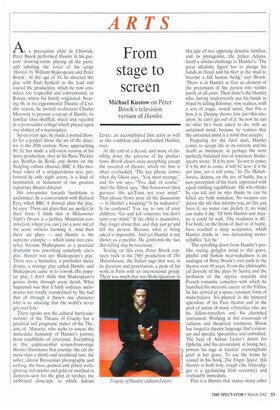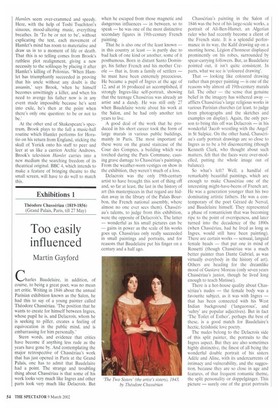From stage to screen
Michael Kustow on Peter Brook's television version of Hamlet As a precocious child in Chiswick, Peter Brook performed Hamlet in his parents' drawing-room, playing all the parts, and labelling the cover of his script 'Hamlet, by William Shakespeare and Peter Brook'. At the age of 30, he directed the play with Paul Scofield in the lead and toured the production, which he now considers too respectful and conventional, to Russia, where his family originated. Nearing 40, in his experimental Theatre of Cruelty season, he invited co-director Charles Marowitz to present a cut-up of Hamlet, its familiar lines shuffled, sliced and recycled in a provocative collage which played upon our idolatry of a masterpiece.
Seven years ago, he made a potted Hamlet for a project about the art of the director in the 20th century, Now, approaching 80, he has made a television version of his latest production, shot in his Paris Theatre des Bouffes du Nord, and shown on the fledgling culture channel, BBC 4. His twohour video of a stripped-down text, performed by only eight actors, is a kind of summation or testament of our greatest expatriate theatre director.
His irreverence towards bardolatry is undimmed. In a conversation with Richard Eyre which BBC 4 showed after the play, he says, 'There are plays that are perfect in their form. I think that A Midsummer Night's Dream is a perfect, Mozartian construction, where you can't cut a note out of the score without harming it. And then there are plays — and Hamlet is the supreme example — which came into existence because Shakespeare as a practical dramatist was reworking somebody else's play. Hamlet was not Shakespeare's play. There was a bestseller, a pot-boiler melodrama, a revenge play called Hamlet, and Shakespeare came in to rework this popular play. I don't think that Shakespeare's genius shone through every detail. What happened was that a fairly ordinary melodrama was totally transformed by the fact that all through it there's one character who is so amazing that the world's never got over him.'
There speaks not the cultural barricadestormer of the Theatre of Cruelty but a practical and pragmatic maker of the Theatre of Maturity, who seeks to rescue the immediate humanity of Hamlet's journey from roadblocks of reverence. Everything in this quintessential screen-from-stage Hamlet illuminates that journey: the cut (by more than a third) and reordered text; the sober, almost Bressonian photography and editing, the bare, pocked and pitted walls, glowing rich scarlet and gold, or swathed in darkness save for the glint of torches; the calibrated close-ups, to which Adrian Lester, an accomplished film actor as well as this confident and undefended Hamlet, rises.
At the end of a decade and more of distilling down the universe of his productions, Brook clears away everything except the essential of Hamlet, which for him is often overlooked. 'The key phrase comes when the Ghost says, "You must revenge," and his son says, "Yes, dad, of course." And the Ghost says, "But howsoever thou pursuest this act/Taint not your mind." That phrase blows away all the discussions — Is Hamlet a weakling? Is he indecisive? Is he confused? You say to one of your children. "Go and kill someone, but don't taint your mind." If the child is insensitive, they forget about that, and they just go and kill the person. Because what is being asked is impossible. And yet Hamlet is not shown as a pacifist. He confronts the fact that killing may be necessary.'
Seizing on this crux, Peter Brook connects back to his 1985 production of The Mahabharata, the Indian saga that was, in its duration and penetration, a peak of his work in Paris with an international group. There was much that was Shakespearean in this tale of two opposing dynastic families, and its protagonist, the prince Arjuna, faced a similar challenge to Hamlet's. The great idealistic figure has to plunge his hands in blood and his feet in the mud to become a full human being,' says Brook. 'There is in Hamlet at first an element of the pretension of the person who wishes purity at all costs. Then there's the Hamlet who, having inadvertently put his hands in blood by killing Polonius, now realises, with a sort of tragic, stoical sense, that this is how it is. Destiny throws him into this situation; he can't get out of it. So now he can do what he's been asked to do, with an untainted mind, because he realises that the untainted mind is a mind that accepts.'
Preparing for the final duel, Hamlet comes to accept life in its entirety and his death as imminent, in perhaps the most perfectly balanced trio of sentences Shakespeare wrote: 'If it be now, 'tis not to come; if it be not to come, it will be now; if it be not now, yet it will come.' In The Mahabharata, Arjuna, on the eve of battle, has a new perception of his truth, expressed with equal riddling equilibrium: 'He who thinks he can kill and he who thinks he can be killed are both mistaken. No weapon can pierce the life that informs you; no fire can burn it; no water can drench it; no wind can make it dry.' Of both Hamlet and Arjuna it could be said, 'The readiness is all.' For both, on the brink of duel or of battle, have reached a deep acceptance, which Hamlet distils in two devastating monosyllables: 'Let be.'
The spiralling down from Hamlet's prolific, racing, polyglot mind to this grave, playful and human near-nakedness is an analogue of Peter Brook's own path in the theatre over 60 years. From the philosophical ferocity of the plays by Sartre and the profusion of the operas, musicals and French romantic comedies with which he launched his meteoric career in the Fifties, he has arrived at a spare, resonant form of make-believe. It's planted in the battered splendour of his Paris theatre and in the pool of actors of many ethnicities who are his fellow-travellers and his cherished instrument. Working at this crossroads of cultures and theatrical traditions, Brook has forged a theatre language that's visionary and specific, speculative and embodied. The heat of Adrian Lester's desire for Ophelia, and his devastation at losing her, powers his rage at Laertes' overemphatic grief at her grave. To use the terms he
8 coined in his book, The Empty Space, this 5" Hamlet is both holy, rough (the Gravedigger is a jig-dancing Irish eccentric) and irrefutably immediate.
This is a Hamlet that makes many other Hamlets seem over-crammed and speedy. Here, with the help of Toshi Tsuchitori's sinuous, mood-altering music, everything breathes. In 'To be or not to be', without explicating the text, each movement of Hamlet's mind has room to materialise and draw us in to a moment of life or death. That this is so telling comes from Brook's ruthless plot realignment, giving a new necessity to the soliloquy by placing it after Hamlet's killing of Polonius. 'When Hamlet has triumphantly succeeded in proving that his uncle without any doubt is the assassin,' says Brook, 'when he himself becomes unwittingly a killer, and when his need to avenge his father now is in any event made impossible because he's sent into exile, he's then at the point when there's only one question: to be or not to be.'
At the other end of Shakespeare's spectrum, Brook plays to the full a music-hall routine which Hamlet performs for Horatio on his return from England, sticking the skull of Yorick onto his staff to peer and leer at us like a carrion Archie Andrews. Brook's television Hamlet carries into a new medium the searching freedom of its theatrical original. BBC 4, which intends to make a feature of bringing theatre to the small screen, will have to do well to match this.















































































 Previous page
Previous page